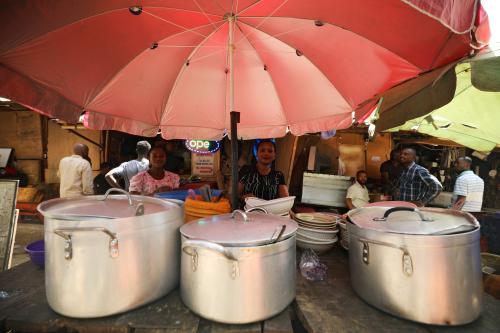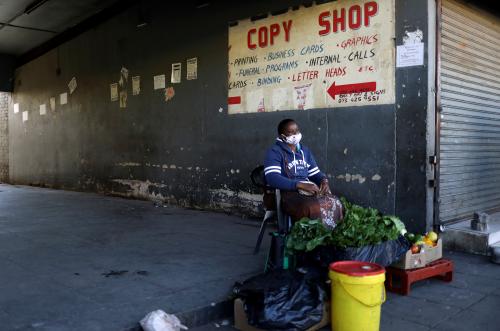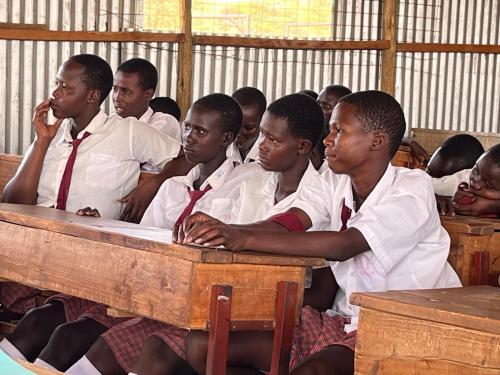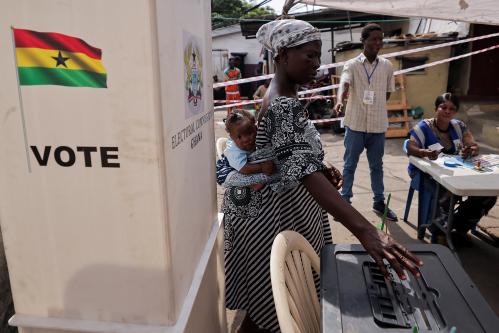Although most African countries have, to date, been largely successful in fighting the spread of COVID-19, with far fewer reported cases and deaths from the disease than Europe, Asia, or the Americas, the pandemic has still had substantial socioeconomic impacts on African citizens. Policy measures to limit the spread of the disease, such as travel restrictions, lockdowns, and school closures—while both necessary and effective at limiting health impacts—have slowed economic activity worldwide. As a result of the health and economic effects of the pandemic, up to 49 million more Africans could be pushed into extreme poverty in 2020. To study the potential socioeconomic impacts of COVID-19 on African countries, the World Bank published a working paper, “Socioeconomic Impacts of COVID-19 in Four African Countries,” in early November. The paper analyzes data from a series of phone surveys undertaken every month since May 2020 with a national sample of households in Ethiopia, Malawi, Nigeria, and Uganda.
Figure 1 shows the percentage of households that have lost income from five sources—farm income, business income, wage income, remittances, and all other sources—in rural and urban areas of each of the four countries. According to the paper, income losses have been particularly severe in Malawi, Nigeria, and Uganda, where a majority of households that relied on income from any of the five sources over the past 12 months have lost income due to the pandemic. These trends were also found in earlier analyses of World Bank survey data from Nigeria. While households in Ethiopia have similarly gone through significant incomes losses due to the pandemic, compared to households in the other three countries, they were less likely to have lost income from each source except business income. In general, across all four countries, business income was the most susceptible to loss from the pandemic, and wage income was generally least affected, perhaps due to the greater ability of wage employees to work from home. In all four countries, patterns of income loss were very similar across rural and urban populations. Overall, the paper estimates that 256 million individuals in these four countries—77 percent of the countries’ total population—live in households that have lost income due to the pandemic.
Figure 1. Percentage of households reporting loss of income sources, by country and rural/urban residence
Source: World Bank, 2020, Socioeconomic Impacts of COVID-19 in Four African Countries
In response to this income loss, an estimated 33 million households across the four countries are using a range of coping strategies to deal with the economic impacts of the pandemic, including relying on savings, selling an asset, reducing food or nonfood consumption, receiving assistance from family members or the government, or doing nothing (Figure 2). The paper finds that in Ethiopia, Malawi, and Uganda, the majority of families in rural and urban areas did not have to resort to a coping strategy, although many Ugandans also relied on their savings. In Nigeria, however, the majority of households in both rural and urban areas reduced food consumption in order to cope with the effects of the pandemic. An earlier Brookings analysis of data from Nigeria found that more than 70 percent of respondents in both rural and urban areas of Nigeria had faced food insecurity since the onset of the pandemic. Notably, the World Bank paper states that food insecurity due to the pandemic is disproportionately borne by households that were already impoverished prior to the pandemic. Also of note, across all four countries, few households received government assistance, emphasizing the weakness of social safety nets and the lack of available government funding for income support.
Figure 2. Percentage of households reporting use of coping strategy, by country and rural/urban residence
Source: World Bank, 2020, Socioeconomic Impacts of COVID-19 in Four African Countries
The authors conclude by emphasizing that, in order to formulate effective policies and target resources to those who need them most, governments, international organizations, and other stakeholders need reliable and timely data on the challenges faced by households. The paper presents some of the first comprehensive descriptions of the socioeconomic impacts of the COVID-19 pandemic in African countries; additional studies are needed to better understand the challenges faced by households across the continent. For more on the socioeconomic impacts of the pandemic, see “Social distancing unlikely to hold up in Africa without a safety net for microentrepreneurs” by Addisu Lashitew and “COVID-19 and the future of work in Africa: How to shore up incomes for informal sector workers” by Louise Fox and Landry Signé.
The Brookings Institution is committed to quality, independence, and impact.
We are supported by a diverse array of funders. In line with our values and policies, each Brookings publication represents the sole views of its author(s).








Commentary
Figure of the week: Socioeconomic impacts of COVID-19 in Ethiopia, Malawi, Nigeria, and Uganda
December 2, 2020